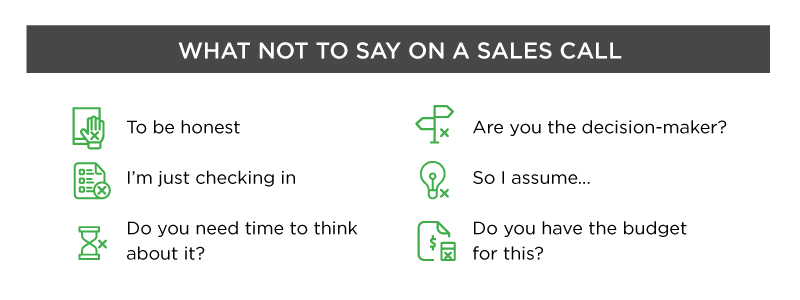What Not to Say on a Sales Call

When making a sales call, using the wrong words could cost you a deal. Here are some phrases to avoid.

Sales is a profession that requires excellent interpersonal communication skills, especially when it comes to talking on the phone. As a salesperson, you need to keep it simple and avoid risky words that could cost you a deal, especially phrases that are generally considered trite or insulting. Following are a few of the worst phrases to avoid during a sales call:
“To be honest”
You might think you’re engendering trust with this one, but in reality, saying “to be honest” does the exact opposite. It breeds distrust because hucksters commonly use it, and it leaves your client with questions regarding your authenticity and honesty. Why do you need to clarify that you’re being honest? Were you not being honest before?
Avoid using this and similar qualifiers, which have no meaning and just raise more questions. Instead, simply state your idea or point. Plain speaking demonstrates to the client that you can be trusted. Individuals who communicate their ideas directly are considered more truthful.
“I’m just checking in”
Nothing erodes trust faster than this disingenuous phrase. You aren’t calling for no reason, and your clients know it. Again, you need to be direct – you’re trying to sell something. Instead of wasting time pretending you called for some other reason, be direct and help the client understand what you’re bringing to the table.
You’re a salesperson with an agenda to sell products. Value your time and be confident in your goals. If you believe in what you’re selling, your clients can sense it in how you communicate and the phrases you use during your sales calls.
So get straight to the point with your agenda. Try saying, “I wanted to follow up on our conversation from last week and answer any questions you have about our products.” Clients will respect your sincerity and belief in your ability to provide value.
“Do you need time to think about it?”
Asking prospects if they need time to think is overly accommodating and often results in lost deals. This question tends to come up on sales calls when a client goes silent. If this happens during your call, stay calm and leave room for the prospect to think and respond to you.
If your prospect needs extra time, let them tell you; don’t say it for them. Focus on driving your conversation to a positive outcome. If the client is undecided, let them communicate that on their own. In that case, let them know that they can take some time and promise to follow up after they’ve had a chance to think it over.
“Are you the decision-maker?”
Asking this question is the fastest way to hit an early wall in your sales calls. It’s a sensitive question that can be borderline offensive, depending on who you’re talking to. Some prospects may consider the question demeaning, as it suggests you doubt their authority. Most people hate to be judged in a way that makes them feel belittled.
Instead of asking prospects if they’re the decision-makers, ask about how the company finalizes its buying decision. This question doesn’t reflect preconceived ideas about your prospect, and the potential client can answer openly without being defensive.
“So, I assume…”
Never assume anything when making a sales call, because assumptions are often based on faulty judgment. Always leave room for your clients to express themselves instead of placing your thoughts in their mouths. If your assumptions don’t align with your client’s needs, ideas, or thoughts, it will make them feel as though you don’t understand them. This can easily result in the client choosing to work with a competitor who “gets them.”
Limiting your assumptions will help build trust with the client. And if you need clarification on something, simply ask your client to clarify. They’ll appreciate your directness and the effort you make to understand them.
“Do you have the budget for this?”
This is another potentially insulting question that can make it seem like you think the client is wasting your time by looking at products they can’t afford. Instead, be patient and allow the client to ask all the questions they need to about pricing. Helping them find a solution within their budget shows your sales skills. It helps earn your prospect's respect and could lead you to close a deal.
Use proper phrases when making sales calls
Using the wrong phrases could make you lose deals and end in a sales slump. When making your sales call, use professional terms that are as direct as possible. Avoid phrases that may breed distrust from the client, such as “to be honest,” and uncomfortable questions such as “are you the decision maker.” Instead, be direct and honest. And listen to your client. If they feel like you understand them, you’ve got a much better chance of making a sale.
If you need some help getting started, MetaGrowth is standing by. We’re experts in building high-performing sales teams. Our Co-founders, Joe Arioto and Josh Hirsch, leverage over 30,000 hours of coaching and consulting expertise to help your company close more deals. We offer hands-on strategies for training, hiring, and maintaining successful sales teams. Contact us to learn more.
Written by
Joe Arioto
